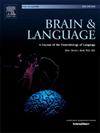Did you say brain or brave? event-related potentials reveal the central role of phonological prediction in false hearing
IF 2.3
2区 心理学
Q1 AUDIOLOGY & SPEECH-LANGUAGE PATHOLOGY
引用次数: 0
Abstract
In the current paper, we report the results from two event-related brain potential (ERP) experiments that examined the time-course of false hearing (i.e., hearing one word when a different one was presented). Target words were presented in background noise whereas the preceding context (either a semantic prime word or a constraining sentence) was not. Participants routinely experienced false hearing, reporting a predictable word when an incongruent, phonological lure was presented. We found that the N400 to falsely heard words was similar to when a predictable word was presented even though a phonological lure was presented. Additionally, the N400 response to correctly identified phonological lures was significantly delayed compared to the response to incongruent words that shared no phonological relation to predictable words, suggesting the listeners engaged in phonological prediction. Altogether, the findings from the current study provide evidence that listeners’ engagement in phonological prediction can lead to misperception.
你说的是聪明还是勇敢?事件相关电位揭示了语音预测在假听中的核心作用
在这篇论文中,我们报告了两个事件相关脑电位(ERP)实验的结果,这些实验检查了错误听力的时间过程(即,当出现不同的单词时听到一个单词)。目标词在背景噪声中呈现,而前一上下文(语义启动词或限制性句子)不存在背景噪声。参与者通常会出现错误的听力,当出现不一致的语音诱惑时,他们会报告一个可预测的单词。我们发现,错误听到单词的N400与出现可预测单词时的N400相似,即使出现了语音诱饵。此外,N400对正确识别的语音诱饵的反应比对与可预测单词没有语音关系的不一致单词的反应明显延迟,这表明听者参与了语音预测。总之,当前研究的发现提供了证据,表明听者参与语音预测会导致误解。
本文章由计算机程序翻译,如有差异,请以英文原文为准。
求助全文
约1分钟内获得全文
求助全文
来源期刊

Brain and Language
医学-神经科学
CiteScore
4.50
自引率
8.00%
发文量
82
审稿时长
20.5 weeks
期刊介绍:
An interdisciplinary journal, Brain and Language publishes articles that elucidate the complex relationships among language, brain, and behavior. The journal covers the large variety of modern techniques in cognitive neuroscience, including functional and structural brain imaging, electrophysiology, cellular and molecular neurobiology, genetics, lesion-based approaches, and computational modeling. All articles must relate to human language and be relevant to the understanding of its neurobiological and neurocognitive bases. Published articles in the journal are expected to have significant theoretical novelty and/or practical implications, and use perspectives and methods from psychology, linguistics, and neuroscience along with brain data and brain measures.
 求助内容:
求助内容: 应助结果提醒方式:
应助结果提醒方式:


